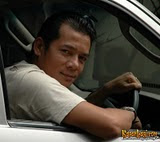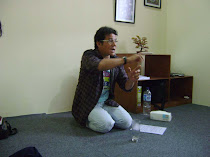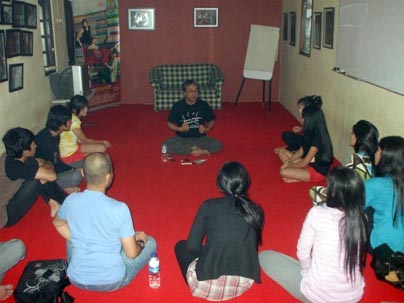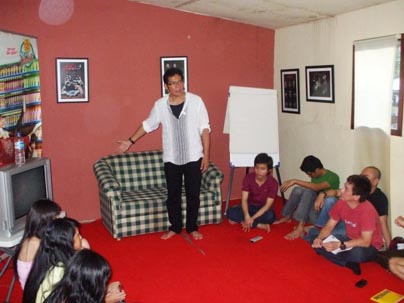Kelas Akting DFC angkatan 9
>> 08 Mei 2010
Kelas Akting DFC angkatan 9 telah dibuka. Pendaftaran dapat dilakukan di Jl. Wahyu 1 No. 98, Fatmawati, Jakarta Selatan. Telp 7660947, 08128662840.
Read more...
Kelas Akting DFC angkatan 9 telah dibuka. Pendaftaran dapat dilakukan di Jl. Wahyu 1 No. 98, Fatmawati, Jakarta Selatan. Telp 7660947, 08128662840.
Read more...Materi Workshop Penyutradaraan
Dasar-dasar teknis pemahaman tentang film dan pembuatan film :
1. Sejarah singkat film
2. Pengetahuan ttg screen direction, framing, tipe-tipe shot dll.
3. Pengetahuan dasar tentang kamera, pergerakan kamera dan lensa
4. Pengetahuan tentang produksi, art, wardrobe dan make up
5. Staging
6. Post production dll
7. Sutradara membaca skenario (memahami tema, menemukan kekuatan cerita, merumuskan gaya, pukulan pertama dan akhir dari sebuah film) - RIRI RIZA
8. Sutradara dan konsep editorial (menciptakan film di kepala, melalui urutan sequence, scene dan shot) - RIRI RIZA
9. Sutradara dan Shot
10. Sutradara dan bintangnya (karakter dalam cerita dan bagaimana menemukan hero dalam film) - RIRI RIZA
11. Apa yang dijual sutradara dalam filmnya - RIRI RIZA
Inilah sebagian materi yang akan diberikan dalam Workshop Penyutradaraan di DFC.
Become an Actor
If you're wondering what it takes to make it in the acting field, you need to ask yourself one very important question before you begin: Why do you want to become an actor? If you answer is that you want to be rich and famous, you should stop right now. Like any art, acting takes hard work and passion for the craft. The business can be gruelling and almost always involves a lot of rejection. There are thousands of actors who work constantly, but are never known by name. They keep at their art because they love it. If you are going to become an actor, so should you.
The World is a Stage!
Any kind of life experience can benefit your acting talent as long as you learn from it. While you need solid, tangible roles and training to build your resume, any project that you undertake that helps you reflect on yourself can be considered a victory. There's no substitute for work experience and training, but life experience adds the seasoning that makes a better actor. Pay attention to all that happens in your life -- good and bad. Living your life fully and with open eyes will make any role you play richer and more real.
Acting information can be acquired in several different ways. You can speak with your peers and people you are connected to who have previous industry experience. For training information check out classes offered at local acting schools. You can find lists of these online. Information on casting directors and agents can be found readily in industry publications such as Ross Reports. You may wish to gain experience by acting in studnet films. Try calling the film departments of schools of the arts in your area.
Workshop Penyutradaraan dimulai tanggal 4 Mei 2010. Pengajar (fixed) adalah : RIRI RIZA, JOHN DE RANTAU dan MATHIAS MUCHUS. Jumlah pertemuan 12 kali dan pada akhir pertemuan membuat film pendek. Pendaftaran masih dibuka, bagi yang berminat untuk info lebih lanjut dapat menghubungi Jl. Wahyu 1 No. 98, Fatmawati, Gandaria Selatan, Jakarta 12420, Telp. 021-7660947, 08128662840.
Read more...Sabtu, 20 Maret 2010 jam 14.00 kelas akting akan diisi oleh Mathias Muchus. Bagi seluruh peserta DFC Acting Course yang mengikuti kelas tersebut agar hadir sebelum jam 14.00. Terima kasih.
Read more...Dari waktu ke waktu DFC Acting Course terus berusaha meningkatkan pemberian materi kepada para peserta, termasuk dalam angkatan 6 ini. Pada tanggal 6 april jam 11.00 siang, Butet Kartaredjasa akan memberikan materi dalam kelas di DFC Acting Course.
Untuk rencana selanjutnya, Mathias Muchus juga akan masuk memberikan materi akting di DFC Acting Course, mengenai waktu akan diberitahukan secepatnya.
DFC Acting Course angkatan ke 7 telah dibuka pendaftarannya, bagi yang berminat untuk mengikuti pelatihan harap segera mendaftarkan diri ke DFC (Dapur Film Community) Jl. AMD VIII No. 40 Lenteng Agung Jakarta Selatan (TB Simatupang). Atau dengan menghubungi Eri : 08128662840
Read more...by: Ekky Imanjaya
Art films or commercial films? Idealism or commercialism? The dualism way of filmmaking in Indonesian film industry occurred for a very long time: Terang Boelan vs Pareh in the 1930s, Tarminah vs Lewat Djam Malam in the 1950s, Sexploitation films vs Garin Nugroho’s in the 1990s, and the list continues. Toward a historical overview, Ekky Imanjaya elaborate both sides of pole--from the birth, their struggles and battles again each other, the developments, the achievements, until recent progresses. But, as a matter of fact, there are some attempts to break the dichotomy and unite both groups in one package.
Resensi Generasi Biru:
Generasi Dalam Bingkai Keliru
oleh :Eric Sasono
Generasi Biru: - Slank adalah salah satu tanda generasi yang penting. Slank dan ”jemaah”-nya lahir dari sebuah keberhasilan deidologisasi dan depolitisasi oleh rezim Orde Baru. Mereka jadi suara moral, tapi bukan dari jenis suara yang sama dengan, misalnya, Munir, yang penuh perlawanan itu. Mereka juga berbeda dari Kantata Takwa. Sayang sekali, menurut redaktur kami, Eric Sasono, film Generasi Biru gagal menangkap apa yang membuat Slank penting. Sutradara Garin Nugroho, John De Rantau, dan Dossy Omar (segmen dokumenter) terjebak dalam sebuah ”kekacauan demi kekacauan itu sendiri.” Keterjebakan itu, bagi Eric, lahir dari sebuah salah baca terhadap Slank. Dan kesalahan membaca itu, mengundang hadirnya catatan lain. Ini genting, jika kita setuju Eric, karena membaca Slank adalah membaca sebuah generasi.
Sumber : rumahfilm.org
Cold reading auditions are different than other auditions. Here you'll be given a script at the audition and you'll play through a scene using the script that you were giving. Most of the time you will have very little preparation, or maybe even no time preparation at all.
Since you don't have very much time to prepare, many actors find these types of auditions quite difficult. So, since they are bit on the difficult side, let's look at some helpful tips that will help you get through a cold reading audition with flair.
Tip#1-Look Down as Little as Possible
Since you may have never seen the script you are using before, you may be tempted to keep your eyes glued on your script, but you don't want to give the director just a look at the top of your head during the audition.
While you are reading through the script and doing your lines, take a quick look at your line, memorize it quickly then, deliver it whike look up so the director will be able to see your face and your expressions. Looking down from time to time is fine, just don't constantly keep your head down in the script.
Tip#2-Listen to the Character Description and Scene Setting
Make sure that you listen to the character description and scene setting that the director gives you before you get started. While you may be tempted to start looking over the lines, knowing the character description and scene setting is more important so you'll be able to understand exactly what the director is really looking for.
Tip#3- Really Communicate and "Play" the Lines
When you are reading with another actor, communication is important. Make sure that you look at the other actor you are reading with and actually communicate and "play" those lines as you speak them. Make the lines real and believeable.
Tip#4-Use Movement and Gestures
Some actors are a bit afraid to move around, but when you are at acold reading audition, using movement and gestures are fine. Just make sure that they compliment the character you are playing.
Tip#5-Watch Your Posture
Your posture is very important as well. Make sure that your posture is playing the role taht you are reading. Acting with your voices is important, but using other body language and posture is important as well.
Tip#6-Always Arrive Early
When going to cold reading auditions, always make sure that you arrive early. This way you'll be able to become a bit more familiar with the area you'll be auditioning in. You'll also make sure that you hear any announcements that are made before the audition as well.















© Blogger template Simple n' Sweet by Ourblogtemplates.com 2009
Back to TOP